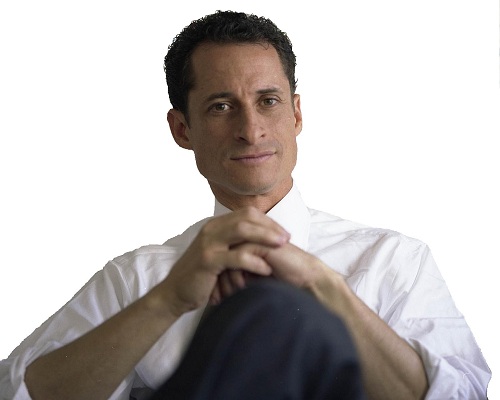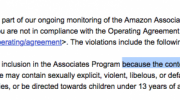 Even if Psychology Today has repeatedly hurt its credibility with such debacles as Satoshi Kanazawa’s phenomenally racist (and boneheaded) assertions, I still appreciate many of PT’s bloggers. I particularly like addiction specialist Stanton Peele — who, incidentally, tore into Kanazawa hammer and tongs before anyone else had shown up at the party.
Even if Psychology Today has repeatedly hurt its credibility with such debacles as Satoshi Kanazawa’s phenomenally racist (and boneheaded) assertions, I still appreciate many of PT’s bloggers. I particularly like addiction specialist Stanton Peele — who, incidentally, tore into Kanazawa hammer and tongs before anyone else had shown up at the party.
Peele has an interesting piece up today on Psychology Today in which he asserts that it’s obvious Anthony Weiner is not a “sex addict” — and, in fact, it’s ludicrous and insulting to call him one. In so doing, Peele makes some ominously good points about what constitutes addiction — and why it’s so common.
The definition of addiction (or dependence) according to the American Psychiatric Association diagnostic manual (on which I was an adviser) focuses on the extremity of the negative consequences of a substance involvement. Despite these health, family, legal, job consequences, the addict is still not able to desist. And they try.
Recognizing their behavior is hurting them, they attempt to quit or to cut back, but repeatedly fail at such efforts….Does this sound like Anthony Weiner? He does not seem to fulfill either the degree of compulsivity or the depth of negative consequences that define addiction. Weiner seems to have been a happy Internet philanderer. (I need to acknowledge here that all of my information is second hand, and that as a clinician I cannot diagnose Anthony Weiner.) He didn’t seem to let his sexting interfere with his job, his media appearances, even his relationship with his wife — who was, according to reports, unaware that anything was amiss.
Let’s return to the case of Bill Clinton…Do you think Clinton is a sex addict? At a minimum, that discussion has completely faded from public interest — to use addiction terminology, Clinton has seemingly fully recovered.
This is not to say that their behavior didn’t have severe negative consequences for each man — Bill Clinton was impeached, only the second president for which this had happened. And Weiner lost his job and may have endangered his marriage.
But neither man seems to have been entrapped in an all-encompassing, life-altering — even threatening — compulsion. Weiner was engaged in all-too-risky behavior, it turns out. But it wasn’t insanely so. He was managing it, sans mistakes, and I bet there are other Congresspeople doing similar things right this moment. (Okay, they may let up just a bit in the aftermath of Weiner.)
In fact, the cases of Weiner and Clinton make clear that having crucial purposes in life is an antidote to addiction. Such countervailing life forces prevent people, first, from sacrificing all to an addiction, and then enable people to escape whatever addictive tendrils have reached out to ensnare them.
Weiner may certainly benefit from therapy and from considering his behavior and what it says about him. But it would be misleading for him, for those treating him, of for those of us considering these questions to label what he did as an addiction.
To do so trivializes addiction, including sex addiction.
Don’t get me wrong; I think the term addiction is thrown around carelessly a lot, as is the concept. It’s not just true about sex. It drives me nuts when people attempt to define someone’s drinking as alcoholism merely because it’s more drinking than they, themselves, are comfortable with. One can be a drunk and not be an alcoholic; similarly, one can be a sex fiend and not be a sex addict. The likes of Gail Dines may disagree with me, but personally if she’d cough up her honest answers to some boneheaded sexual satisfaction survey in Cosmo, I would be far more likely to take her claims about appropriate sexual behavior seriously. Someone who’s decided no sex is good sex doesn’t get to define what good sex is for the rest of us.
From what I know of the Weiner affair, I very much agree with Peele, though, again, I have a few beefs with the term “sex addiction” in the first place. While I don’t dispute the existence of the phenomenon, I think defining it presents catastrophic problems. I prefer the term “compulsive sexual behavior” to “sex addiction,” because I do think the term “sex addiction” has way too much baggage to avoid being misused.
I’ve occasionally disagreed with some of my sex-positive colleagues who have claimed that sex addiction as a phenomenon does not exist. I think that’s crazy; I prefer to use the term “compulsive sexual behavior,” but whatever. Compulsive sex-seeking despite risk and lack of satisfaction is too common and too dangerous to frame such behaviors as “healthy” for some pro-sex political reason.
I don’t dispute that many cases of so-called sex addiction — especially when it’s labeled so by others — are cases of relationship problems or garden-variety compulsive behavior, or both — or, even more commonly, a label pulled out by someone who objects to someone else’s behavior. But I also acknowledge that identifying as a sex addict isn’t like identifying one’s a sexual orientation or gender. One doesn’t necessarily get to define it for one’s self, because a hallmark of addiction is denial. How many people engaged in sexually self-destructive (and/or other-destructive) behavior refuse to acknowledge they’re doing it, even when presented with evidence — and concrete consequences?
It’s for that reason that clinical benchmarks are needed — measurements, descriptions, criteria. And measurements, when it comes to sex addiction, are placed in a context where sexual behavior is almost always subject to societal judgements. That’s why a descriptive model of sexual behavior is needed for clinical practice — describing what people do and how it affects them, not deriving from some idea about how peoples’ sexual behavior “should” be.
Anti-sex self-appointed moralist forces — in the U.S., usually Christian ones — claim (repeatedly) that a descriptive model of sexual behavior establishes a pro-sex bias in clinical practice. They may define that as being debaucherous, slutty, evil, bad, sinful, wrong. They may claim that it favors people who want to do “naughty” things like have same-sex unions or, you know, jack off and stuff.
I would assert that yes, yes, yes, a descriptive psychological model of sexual behavior does establish a pro-sex bias — in the same way that a descriptive social agenda establishes a pro-diversity, pro-pluralism bias. If some people want to call that “anti-Christian,” “pro-Muslim,” “pro-Jewish,” “pro-minority,” “pro-immigrant” or “anti-White,” well…fine, then. Personally, I don’t mind if neo-Nazis see me as anti-White.
I also don’t give a damn if Pat Robertson thinks I’m a slut. The truth is that any descriptive model of sexual behavior acknowledges a lot more sex and a lot more sexual variation than any dictatorial religious or moral structure I’ve ever seen. Systems prone to judgement do a piss-poor job of practically managing behavior.
They also do a really fucked job of establishing clear definitions and guidelines that people can stick to. Whether people should or they shouldn’t stick to those restrictive guidelines is another issue entirely; the fact is, they don’t. The assertion that Christian faith can “heal” anyone from things like homosexuality or promiscuity works just fine if you believe every fucked-up garbage lie any preacher, priest or Christian self-help guru ever tells about their own sexual behavior. How many pastors and priests need to be publicly exposed as having lied about their sex lives before people start to want the truth about human sexual behavior, rather than comforting lies and broad-stroke generalizations turned into moral laws that don’t make any sense, are routinely broken and make almost no one enduringly happy?
That’s why a clinical tool like the DSM is important, for all its gargantuan flaws. I’m not suggesting the DSM is perfect, just that if you’re going to acknowledge that sometimes sexual behavior is destructive (and you’d have to be a bit of an idiot to claim it’s not), one needs some kind of external diagnostic criteria to define it, to avoid making clinical judgements based on moral judgements.
Given the ridiculous anti-sex hysteria whipped up around Weiner’s actions, it’s nice to get a reminder from Peele that there’s such a thing as a sane and descriptive addiction model.
Image: weiner.house.gov.





People who should know better discuss sex addiction instead of compulsive sexual behavior is because if they didn’t, people would begin to discuss it sensibly. If compulsive sexuality is merely a variation of compusive behaviour generally, such as gambling, eating, handwashing, vacuuming, and other innocuous things that compulsive people do compusively, then that could only mean that sex is innocuous as well. And as we well know, shame and stigma are weapons not to be abandoned so carelessly.
Bleh, I’m tired of politicians hypocritically acting like anyone who has sex except for missionary with their spouse is some sort of pervert-sex-adict. I’ve sexed people before and I’m pretty sure it’s damn common. The only issue at all here is if he lied to / cheated on his wife… and that should be a personal issue between the two of them. But instead these hypocrites act like it’s a reasonable thing for public questioning and when he lies about it they say that he’s clearly dishonest and not fit to be in office. It’s bullshit and even more bullshit because the people getting all outraged probably are having their own affairs and telling their own lies. It’s human nature to have sex, and it’s also human nature to lie about it… getting outraged about it is like being mad because the sky is blue.